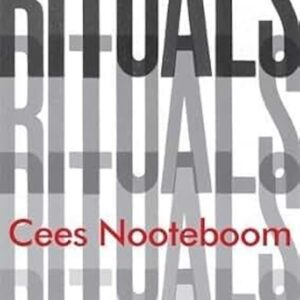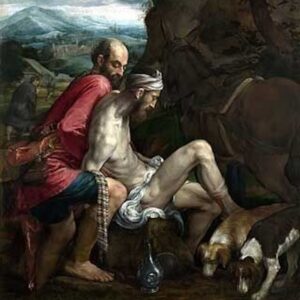I heard of shy Caedmon, sneaking out of the feast before the harp was passed to him, for he could not sing, and he fell asleep in the barn by the animals he was charged to keep and dreamed of an angel who told him to sing, so sing he did, of the creation first and then of every other holy tale until no great thing God had done had failed to find its way into English.
And I heard of his nameless peer who dreamed of syllicre treow on lyft leodan, leohte bewunden, beama beorhtost—wondrous tree lofting high, all wound up in light, the brightest Cross.
I heard of Gawain tested and found true enough, and from the same poet heard how wandering in Britain’s backwoods he came upon Heavenly Jerusalem and his pure pearl there, the little girl he lost on this very unhappy Earth.
I heard from Chaucer, paid in tankards of wine, how they went from every shire’s end to Canterbury, the holy blissful martyr for to seek, that them had helped when that they were sick.
I heard Dame Julian who saw Christ: And in this he showed me a little thing, the quantity of a hazel nut lying in the palm of my hand, as it seemed. And it was as round as any ball. I looked upon it with the eye of my understanding, and thought, What may this be? And it was answered, It is all that is made.
I heard William Dunbar’s lament for the Makars, and John Skelton sing of Elynour Rummyng’s very bad beer. But this new English, my own English—that I heard for the first time when it was written: Whoso pulleth out this sword of this stone and anvil is rightwise king born of all England.
And it was written in Tyndale’s Bible: For God so loveth the worlde yt he hath geven his only sonne that none that beleve in him shuld perisshe: but shuld have everlastinge lyfe.
There is our prose in the first flush of youth. There is Philip Sidney writing his Arcadia to amuse his sister, and Robert Burton anatomizing melancholy, and Thomas Browne’s stark religion and archaic urns and burgeoning gardens.
Follow Michael Drayton through every corner of the Kingdom of Many Blessings, his Poly-Olbion. Hear Vaughan’s waterfall. See Southwell’s burning babe and Crashaw’s flaming heart of Saint Teresa. Turn to John Donne for elegy, the end of all relation, and to Herbert for love and for prayer to fill the bare ruined choirs.
Thomas Traherne chided me: Men do mightily wrong themselves when they refuse to be present in all ages: and neglect to see the beauty of all kingdoms.
So I laid me down with Izaak Walton in thicket and by riverside, and with Andrew Marvell in a green shade; with Robert Herrick I danced the harvest home. (William Morris and Richard Jefferies would see the green receding and the time when it would come again.)
I’ve seen the wind lift the hair of Keats’s Autumn and sat beneath the lime-tree with Coleridge. Went with Emilia Lanier to Cookham and with Jonson to Penshurst. I’ve been to Pemberley and Howard’s End, to Redwall Abbey and Bag End. I’ve been up and down the Tees with Anne Wilson, and turned thought upon thought uneasily with Charlotte Smith on Beachy Head.
Through the sloughs I’ve gone whistling with John Clare, and gone up Nan Shepherd’s living mountain in the Cairngorms. Through wild Wales with George Borrow I’ve been, and to the primordial Orkneys with Edwin Muir and George Mackay Brown.
R. S. Thomas preached to me with a hard verse, and George MacDonald with fantasy. I’ve heardthe Book of Common Prayerand the English Hymnal, heard Hopkins with his sprung rhythm and Robert Bridges with his loose alexandrines forever testify to the beauty and the glory of creation.
And amazing grace: I heard John Newton sing the Olney Hymns with William Cowper, and heard of Cowper’s mad task to put in words the apocalypse of a winter evening’s walk. I heard William Blake sing of Jerusalem builded among the dark Satanic mills, and of his arrows of desire.
The Holy Grail came alive again in the words of Arthur Machen and Charles Williams and John Copwer Powys. Merlin spoke again through Mary Stewart. And Eden—I heard J. R. R. Tolkien tell his son away at war that certainly there was an Eden on this very unhappy Earth, and I have studied The Natural History of Selborne.
If you have ears to hear and eyes to see, the York Mystery Plays come alive again in the mysteries of Dorothy Sayers, Agatha Christie, P. D. James. In that bitter century I found so many other women of faith without whose words I might never have found faith myself: Helen Waddell, Rose Macaulay, Caryll Houselander, Rumer Godden, Eleanor Farjeon, Barbara Pym, Evelyn Underhill.
I’ve heard the wind blow in the willows by Alice Oswald’s River Dart and whip across Watership Down, and moan in the Scottish Borders with the sound of Sir Walter’s minstrelsy. Hawks dove through that wind in the endless quest to trade death for life, and when J. A. Baker saw them at it, he knew that the hardest thing of all to see is what is really there.
I’ve blinked and sputtered with D. H. Lawrence in the mines, and delved deeper to where Jaquetta Hawkes knew the old gods and goddesses still live in the bones of the land. I’ve gone with T. S. Eliot to Burnt Norton and East Coker and Little Gidding, looking for history, for England.
I heard the stories of Tess and Jude in Wessex, and MacPherson’s Ossian, and Percy’s relics of ancient English poetry, all as if they’d come up out of the bedrock, out of the circling seas, out of the dream that is no dream, the living figures of some great allegory of love.
And how I’ve loved to hear from the eccentrics: Lawrence Durrell, who first taught me the beauty of place; Alan Watts, who wound up a hippie in California but to the end of his days talked of pubs and gardens; and R. H. Blyth, whose Zen is my Zen, and whose Gospel is my Gospel; and Phillip Sherrard, from whom I first learned what it means to live in a cosmos.
All these whom I have mentioned by name and by their work, and many more whom you may know, are to me like the gallant knights and bold ladies sent questing over a land that is Britain and it is Faerie. Long ago in a poem it was written that she who sent such men and women questing was called Gloriana in Faerie, and in this very unhappy Earth she was called Elizabeth. That was a harsh queen, but with the same name and in our time she came again, no longer a tyrant but like the still point, she seemed, of the turning world. And now that Elizabeth, that Gloriana, has passed away. So for now there is no more to say but:
God save the King. Long may he reign.
Jonathan Geltner lives in Ann Arbor MI with his wife and two sons. His translation of Paul Claudel’s Five Great Odes is available from Angelico Press and a novel, Absolute Music, is available from Slant. If you enjoy his posts at Close Reading, check out his new Substack, Romance and Apocalypse, for more frequent and in-depth essays on the places where literature and other arts meet religious ideas and experience.





